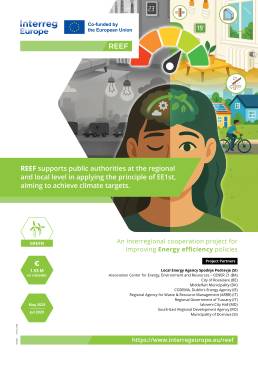| Project name | Regions putting Energy Efficiency First (REEF) |
| Duration | May 2025 – July 2029 (51 months) |
| Programme | Interreg Europe |
| Budget | 1.95 million EUR |
| Project Website | https://www.interregeurope.eu/reef |
REEF
REEF (Regions putting Energy Efficiency First) is a transnational cooperation project under the Interreg Europe Programme, focused on enhancing the capacity of local and regional public authorities to integrate the principle of Energy Efficiency First (EE1st) into relevant development policies. Anchored in the 2023 revision of the EU Energy Efficiency Directive (EED), the project addresses the need to prioritise energy demand reduction and more efficient energy planning as part of broader territorial strategies.
The project facilitates interregional exchange and stakeholder involvement to explore how existing policy instruments, such as development strategies, operational programmes, and local climate plans, can be aligned with EE1st considerations. Participating regions examine tools, incentives, and governance approaches related to the integration of energy efficiency into public decision-making processes, within the wider context of EU climate and energy goals.
Background
The 2023 revision of the EU Energy Efficiency Directive (EED) legally establishes the principle of Energy Efficiency First (EE1st) as a cornerstone of European energy policy. Instead of focusing primarily on expanding energy supply, the directive calls on policymakers to prioritize the benefits of reducing energy demand wherever possible.
With limited time remaining to meet the EU Green Deal targets by 2030, the implementation of EE1st has become urgent – but far from straightforward. While the EED outlines national-level requirements, the EU’s EE1st Guidelines emphasize that local and regional authorities play a crucial role in putting this principle into practice.
At the territorial level, decisions on public spending, infrastructure investment, permits, incentives, and procurement should all reflect EE1st considerations. However, many barriers still hinder effective implementation. These include a general lack of public awareness, limited knowledge on how to assess and compare energy options, low levels of financial literacy, and the absence of enabling processes and financial mechanisms – such as energy performance contracting and solutions for the landlord-tenant split incentive dilemma.
The REEF project addresses these challenges by supporting local and regional governments across Europe and in two EU candidate countries. It aims to strengthen their ability to embed the EE1st principle in policy and planning. Through interregional learning, peer exchange, and stakeholder engagement, project partners will:
- assess existing barriers to EE1st,
- share good practices and technical tools,
- improve the integration of EE1st into broader policy contexts,
- and explore appropriate incentives and financing models.
In doing so, REEF contributes directly to EU climate goals and revised energy efficiency targets. It facilitates policy change by equipping authorities with the knowledge, tools, and collaborative frameworks needed to adapt key instruments – such as Operational Programmes, Development Strategies, and Local Energy and Climate Plans – to reflect a future-oriented, energy-efficient path.
Project’s overall objective
REEF’s overall aim is to support public authorities at local and regional level to apply the principle of EE1st across relevant policy areas, thus contributing to achieving climate targets.
This overall aim requires careful implementation of interregional exchange and learning activities, in order to:
- Assess REEF territories’ status in relation to a series of potential barriers to application of the EE1st principle;
- Identify and analyses how these barriers can be addressed in relation to measures for capacity and understanding, assessment tools, integration of EE1st into the policy context, incentives, funding and financial support;
- Identify and analyse tools (Good Practices) to support EE1st assessment on decisions related to selection and implementation of climate and energy measures and their monitoring;
- Make policy change a reality, using the above learning to adapt existing policy instruments with elements that support application of the EE1st principle.
Partners
- Local Energy Agency Spodnje Podravje (LEASP) – Slovenia (SI)
- Municipality of Dornava – Slovenia (SI)
- South-East Regional Development Agency – Romania (RO)
- Regional Agency for Waste & Resource Management (ARRR) – Italy (IT)
- Regional Government of Tuscany – Italy (IT)
- CENER 21 – Center for Energy, Environment and Resources – Bosnia and Herzegovina (BA)
- Ialoveni City Hall – Republic of Moldova (MD)
- City of Roeselare – Belgium (BE)
- Middlefart Municipality – Denmark (DK)
- CODEMA – Dublin’s Energy Agency – Ireland (IE)
Two associated policy authorities are also involved:
- Municipality of Breza – Bosnia and Herzegovina (BA)
- South Dublin County Council – Ireland (IE)

